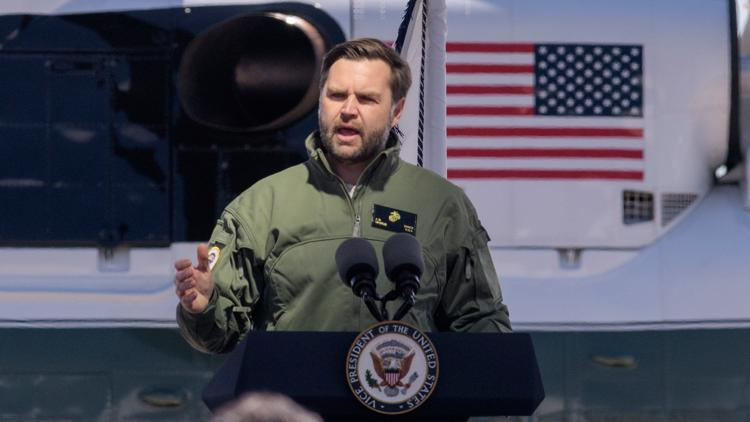Tensions at Pituffik: Space Force Colonel Pushes Back After VP Vance Remarks on Greenland Policy
A high-level visit to Pituffik Space Base in Greenland by Vice President J.D. Vance has ignited controversy within the U.S. military ranks, highlighting an emerging rift over President Donald Trump’s Arctic strategy and the administration’s growing critique of Denmark’s stewardship of Greenland.
A Visit Meant for Diplomacy, Turned Political
Originally planned as a low-profile trip by Second Lady Usha Vance and several cabinet officials to attend a traditional dogsled race, the itinerary quickly transformed after pushback from local Greenlandic officials. Vice President Vance joined the delegation and the visit became a platform for outlining the Trump administration’s assertive stance on Arctic national security and Greenland’s future.
While at Pituffik Space Base on March 28, Vance delivered prepared remarks to U.S. troops in which he expressed support for Trump’s Arctic policy and issued pointed criticisms of Denmark’s defense commitment, especially in relation to Greenland. Vance cited underinvestment, strategic negligence, and increasing threats from China and Russia as justifications for President Trump’s more ambitious Greenland agenda.
“Denmark has not kept pace in devoting the resources necessary to keep this base, to keep our troops, and… to keep the people of Greenland safe from a lot of very aggressive incursions,” Vance said.
Col. Susan Meyers Responds
Following Vance’s visit, Col. Susan Meyers, commander of the 821st Space Base Group, sent a base-wide email on March 31 distancing herself—and implicitly the base’s leadership—from Vance’s comments. In the message, obtained by Military.com, Meyers wrote:
“I do not presume to understand current politics, but what I do know is the concerns of the U.S. administration discussed by Vice President Vance on Friday are not reflective of Pituffik Space Base.”
Meyers, who oversees the Pentagon’s northernmost military outpost, emphasized unity among the American, Danish, Canadian, and Greenlandic personnel stationed at the base:
“I commit that, for as long as I am lucky enough to lead this base, all of our flags will fly proudly — together.”
Her remarks reflect a diplomatic posture within military ranks that contrasts sharply with Vance’s more geopolitical critique of Denmark’s role in Greenlandic defense.
Pushback from the Trump Administration
In response to Col. Meyers’ comments, Department of Defense Chief of Staff Joe Kasper issued a rare rebuke, reminding personnel that civilian control of the military is non-negotiable:
“Actions to undermine the chain of command or to subvert President Trump’s agenda will not be tolerated at the Defense Department,” Kasper stated in an email to Military.com.
While Meyers did not explicitly defy orders, her email has raised concerns of insubordination and has added fuel to the debate over the scope of military leaders’ discretion in commenting on foreign policy.
Trump’s Greenland Strategy Reignited
Trump’s vision of Greenland as a critical national security asset has been a hallmark of both his first and current terms. In 2019, he made headlines for suggesting the U.S. should consider purchasing Greenland from Denmark—a proposal that was widely ridiculed at the time but has since gained traction among national security experts citing Arctic competition with China and Russia.
Vance’s remarks underscore a reassertion of that strategy:
“This is why President Trump’s policy in Greenland is what it is… you saw significant investments in Arctic security, and it will continue over the next four years under President Trump’s leadership.”
This marks a significant shift in tone and approach, aligning more directly with Trump’s America First foreign policy, which views regions like Greenland not merely as allied territories but as potential strategic liabilities if not directly managed or secured by the United States.
A Divided Message
This episode illustrates the complex balancing act between military professionalism, alliance diplomacy, and political messaging under the Trump administration. While the White House pushes for more assertive postures in critical regions like the Arctic, commanders like Col. Meyers are walking a fine line between executing policy and maintaining morale and cohesion on multinational bases.
For now, Pituffik has become the unlikely epicenter of a broader policy dispute — one with implications for the U.S.-Denmark alliance, the future of Arctic defense, and the limits of military expression in a polarized political environment.
Outlook
As the Trump administration continues to prioritize Arctic operations and reevaluate its global basing strategies, Greenland—along with its layered international partnerships—may serve as a bellwether for how U.S. policy will reconcile alliance diplomacy with national security imperatives.
Whether Col. Meyers’ actions spark further disciplinary review remains unclear, but the tensions they reveal are likely to persist.

